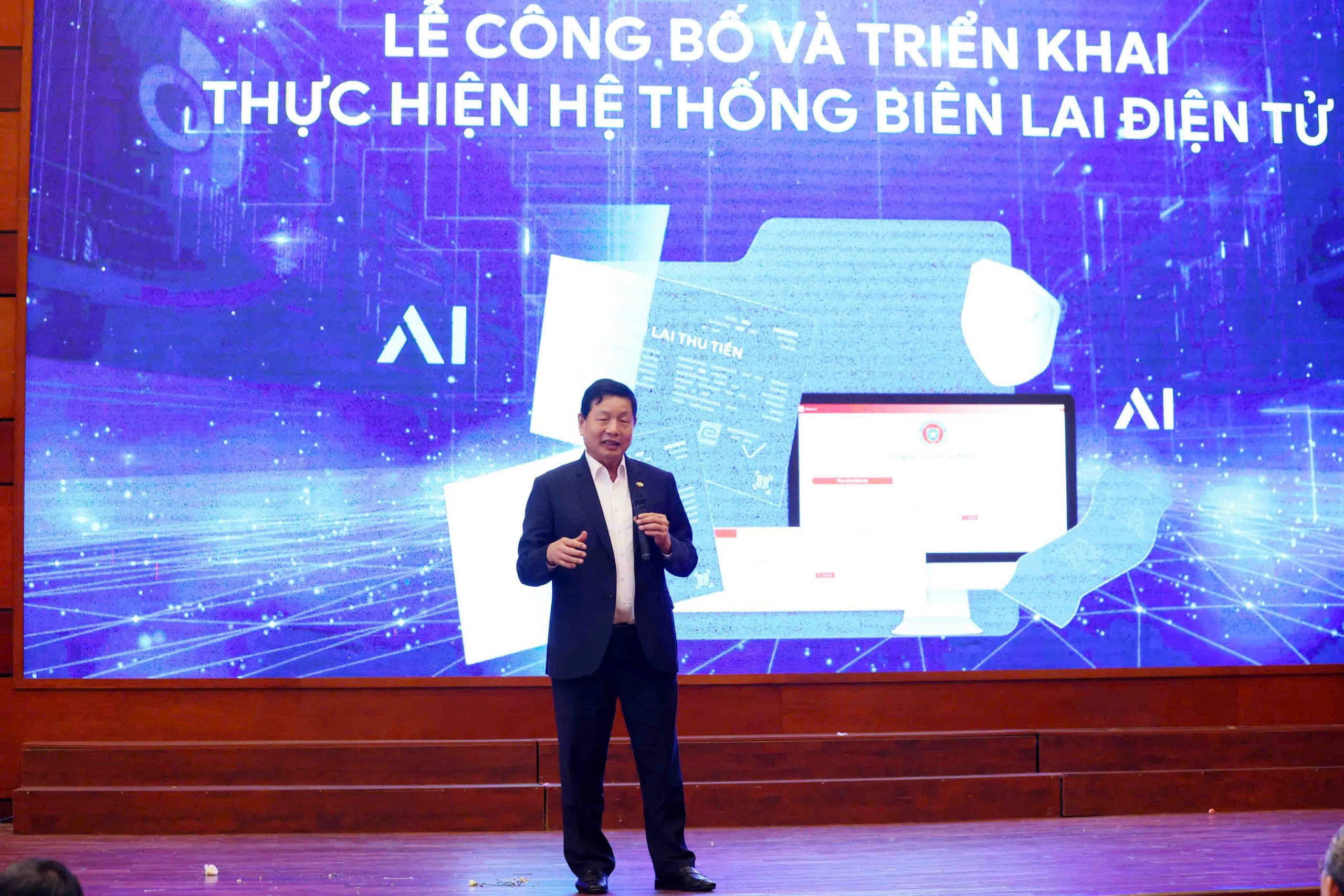Ministry of Justice Leads the Way in Digital Transformation with AI-Powered Electronic Receipts for Civil Judgment Enforcement
•
04/07/2025
Hanoi, July 4, 2025 – This morning, the Ministry of Justice officially launched the Electronic Receipt System, marking an important milestone in applying digital technology and Artificial Intelligence (AI) to the field of civil judgment enforcement. This initiative demonstrates the Ministry’s proactive approach to innovation and comprehensive digital transformation in the justice sector, aligning with the orientation set out in Resolution No. 57-NQ/TW. Within just the first week of operation, since June 23, the system has recorded nearly 3,000 electronic receipts issued, corresponding to nearly VND 2,000 billion in collected and remitted funds.

The Ministry of Justice officially implements electronic receipts in civil judgment enforcement nationwide.
The launch ceremony of the Electronic Receipt System took place as part of the Announcement Ceremony for Organizational and Personnel Decisions in the Civil Judgment Enforcement System of the Ministry of Justice. Attending the event were Minister of Justice Nguyễn Hải Ninh; Deputy Ministers of Justice; leaders of the General Department of Civil Judgment Enforcement (GDCJE); representatives from the Supreme People’s Court, the Supreme People’s Procuracy, and the Ministry of Science and Technology; along with leaders of departments under the Ministry of Justice, heads of divisions under the GDCJE, and 34 Directors of provincial and municipal Civil Judgment Enforcement Departments across the country.

The launch of the Electronic Receipt System took place within the framework of the Announcement Ceremony for Organizational and Personnel Decisions in the Civil Judgment Enforcement System of the Ministry of Justice.
The system is one of the key subsystems within the Digital Civil Judgment Enforcement Platform – a centralized digital platform for leaders, officers, citizens, and enterprises, developed under the direction of the General Department of Civil Judgment Enforcement, Ministry of Justice. Notably, the implementation of this system is a concrete step toward realizing Resolution No. 18-NQ/TW dated October 25, 2017, of the 12th Party Central Committee, which aims to build a streamlined, efficient, and effective organizational structure.
By minimizing manual operations, shortening processing time, reducing errors, and strengthening centralized management, the system not only enhances professional efficiency and streamlines administrative operations but also lays the foundation for a modern, professional judicial administration that serves citizens and businesses more quickly and transparently.
Specifically, the Electronic Receipt System enhances transparency, speed, safety, and data continuity in financial management for civil judgment enforcement through the application of advanced AI technology. The system enables full digitization and automation of the receipt generation process from document scanning, automatic data extraction via AI-OCR technology, digital signature approval, to automatic receipt numbering and centralized storage.
As a result, civil judgment enforcement officers can easily manage and search data on the electronic system instead of manually processing paper-based records that are often cumbersome and error-prone, now with assistance from AI agents.
Citizens and businesses can also look up receipt information anytime, anywhere via the online portal, ensuring openness and convenience. For leaders and administrators, the system provides real-time data reporting, supporting swift decision-making and improving management effectiveness.
With the Electronic Receipt System officially implemented nationwide from July 2025, all payment transactions are strictly monitored and reconciled within the system, ensuring compliance with legal regulations, preventing losses, and strengthening the credibility of the sector.
The system is not merely a management software it represents a foundation that transforms the entire operation of the civil judgment enforcement sector toward a modern, transparent, and citizen-centric governance model. Previously, on June 23, 2025, the Electronic Receipt System was piloted in Ho Chi Minh City, marking an important step in the digital transformation of the civil judgment enforcement sector in one of the busiest localities in the country.
In 2024, the national civil judgment enforcement system had to execute more than one million enforcement decisions, totaling over VND 400,000 billion, and issued approximately 10 million paper receipts figures that highlight the necessity of digital transformation in this field.
Mr. Nguyễn Thắng Lợi, Director General of the General Department of Civil Judgment Enforcement, shared about the official deployment of the Electronic Receipt System in civil judgment enforcement activities: “The implementation of the Electronic Receipt System is an important step toward better serving citizens—allowing them to make payments and receive enforcement certificates anytime, anywhere, instead of relying on traditional cash payments and paper receipts. The system, jointly designed by the Department and FPT, meets three core requirements: issuing electronic receipts via email and SMS; centralized storage for management and reporting; and enhanced transparency in financial transactions. After operating since June 23, nearly 3,000 electronic receipts have been issued, with nearly VND 2,000 billion processed through digital channels showing clear effectiveness and a right direction in digitalizing the civil judgment enforcement process.”

Mr. Trương Gia Bình, Chairman of FPT Corporation, affirms that digital technology and AI hold immense power to help the Ministry of Justice become one of the most advanced judicial institutions in the world.
On behalf of FPT Corporation, Mr. Trương Gia Bình, Chairman of FPT, stated: “Vietnam is standing at a pivotal moment, with unprecedented opportunities to redesign and modernize national management systems to world-class standards. The Ministry of Justice plays a crucial national role, and in this new context, technology will empower the judicial sector to enforce laws effectively, efficiently, and economically. Under the leadership of the Party and the Government through the ‘Four Pillars,’ we are achieving remarkable progress. The Ministry of Justice has pioneered a two-phase digital transformation roadmap Urgent and Breakthrough and specifically, the Electronic Receipt System was deployed in record time just 30 days. FPT is honored to accompany the Ministry in driving transformation and contributing significant value to the nation. Our aspiration is to simplify public administrative procedures through technology. The Electronic Receipt System is a groundbreaking example of a paperless, AI-powered platform that enables faster and more convenient operations within minutes or even seconds on a borderless digital foundation. This is just the beginning, a pivotal milestone. Many challenges and critical tasks lie ahead, and we must strive toward systematic data exploitation and processing. We firmly believe that digital technology and AI possess extraordinary power to help the Ministry of Justice become one of the most advanced judicial institutions in the world.” As the civil judgment enforcement sector continues to improve operational quality and modernize its management approach, the deployment of the Electroni.
In the coming period, the Digital Civil Judgment Enforcement Platform—comprising multiple applications such as the Electronic Receipt System, AI-powered decision-support tools, petition management, and public service portal integration—will continue to be expanded and strengthened. These efforts will help comprehensively transform management processes, enhance operational efficiency, and improve service quality for citizens.
As the technology partner implementing the solution, FPT collaborated closely with the General Department of Civil Judgment Enforcement to design and deploy the Electronic Receipt System in record time just 30 days. FPT experts and the Ministry of Justice jointly developed, deployed, and trained personnel nationwide to ensure seamless operation starting from July 1, 2025. FPT continues to accompany the Ministry of Justice in particular and government agencies, ministries, and enterprises in general—on the journey of digital transformation, realizing the vision of Resolution No. 57-NQ/TW.




